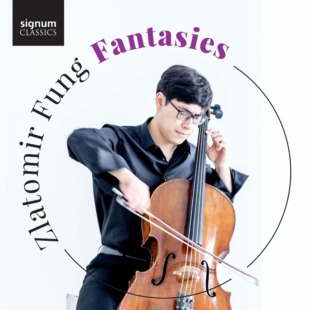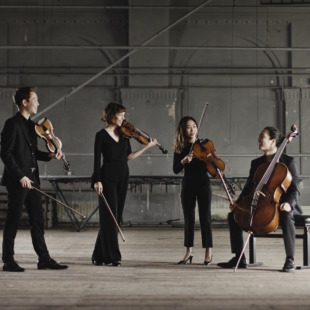
Zlatomir Fung cello
Fantasies
with Richard Fu piano
Signum Classics SIGCD882 released 25 April 2025
Fung’s tone is varied and secure and he has a wide variety of attack and phrasing, from the tender to the aggressive, matching the changing moods of the music, coupled with playful use of vibrato.
Martin Cotton, BBC Music Magazine, June 2025
I love this gentle opening – no piano to start … The opening of the Fantasy on Janáček’s opera Jenůfa, written and played by cellist Zlatomir Fung with pianist Richard Fu. Sympathetic, emotionally engaged with the opera’s musical moods and, where necessary, impressively virtuosic – especially elsewhere on the album in operatic fantasies on Donizetti, Rossini and Carmen and a couple of straight arias transcribed from Wagner and Tchaikovsky. It’s an impressive solo debut.
Andrew McGregor, BBC Radio 3 Record Review, 3 May 2025
This is unexpected. A bright young cellist – one of the brightest, in fact – makes his recorded debut with a collection of opera fantasies… Fung has even composed his own fantasy on Jenůfa which you expect will be a parody but actually teases out Janáček’s fevered melancholy rather well.
Richard Bratby, The Spectator, 3 May 2025
Fung’s performance is spectacular… Fung’s own Fantasy on Janáček’s Jenůfa is a triumph, the opera’s idiosyncratic language undiluted. It’s the best thing on the disc and deserves to be a repertoire standard… I enjoyed this disc immensely. Pianist Richard Fu provides athletic, idiomatic support and the recorded sound has depth and warmth.
Graham Rickson, The Arts Desk, 3 May 2025
Fung throws his own hat into the ring with a fifteen-minute potpourri of themes from Janáček’s Jenůfa, showing himself every bit the equal of his nineteenth-century predecessors – not merely a prodigious cello virtuoso but no mean composer either, reapplying those time-honoured techniques to a profoundly different kind of opera.
David Smith, Presto Classical, 25 April 2025
Album of the Week
Norman Lebrecht, The Critic, 9 March 2025
I love artists who attempt the impossible… The American cellist Zlatomir Fung has composed a fantasy on Janáček’s opera Jenůfa, a feat that defies credibility. The tunes and rhythms of Jenůfa are rooted in Czech speech patterns. Erase the voice, and what’s left? An X-ray. Fung and his pianist Richard Fu present fifteen minutes of skeletal examination in which not only the sounds but the tensions of Janáček’s masterpiece are grippingly realised. I can hardly believe that what they have done here is doable. I need to hear it live.
Norman Lebrecht, Lebrecht Weekly/La Scena Musicale, 7 March 2025

Leonkoro Quartet
Debut North American Tour supported by BBT – Spring 2025
They were never afraid to be understated, they featured splendid ensemble work, and they always exuded a unified and pleasing collective sense of the music. . . . They closed the concert with Felix Mendelssohn’s String Quartet in E Minor, Op. 44, No. 2 which they attacked with an abundance of punch and passion. Their rapid passages were exhilarating and their flowing sections were as smooth as water. The Scherzo galloped yet had a beautifully graceful conclusion while the Andante was song-like in its appeal. The final movement was an exciting Presto that managed to be both agitated and slightly honeyed.
M L Rantala, Hyde Park Herald (Chicago), 7 April 2025
In addition to the youthful energy one might expect from this young group of players, they demonstrated mature intensity and well-rehearsed polish … After several rousing ovations, Leonkoro Quartet did a lovely encore of Crisantemi (chrysanthemums) by Giacomo Puccini. This thoughtful and moody piece was a perfect synopsis of their performance. They were very entertaining, and I hope to see them again.
Louis Harris, 3CR Chicago, 6 April 2025
SCHENECTADY
In an ambitious and impressive performance at Union College Sunday, the Leonkoro String Quartet made its local debut in the Capital Region Classical series. . . . German composer Paul Hindemith (1895-1963) used to be big, but today his music is rarely heard, at least on this side of the Atlantic. The Leonkoro is taking up the cause of their fellow countryman. Hindemith’s Quartet No. 2 in F minor, which came before intermission, is a piece that demands attention.
At its most exalted, the music seared and crackled, moving like a house afire. Emotional extremes were everywhere, challenging the quartet in numerous ways. This was some of the best playing of the afternoon, as through the mayhem, the quartet held the line, steady as she goes. The last movement had a mind of its own and just kept going. The players let us know when the final bars were approaching by adding a new purposefulness and solidity to their sound. That, in turn, was met by a hearty ovation.
Joseph Dalton, Times Union, 31 March 2025
NEW YORK – Sublime brilliance at the 92nd St Y.
From the opening notes of Caroline Shaw‘s Entr’acte, it was immediately apparent that listeners were experiencing a string quartet of exceptional caliber. . . . The ensemble navigated Beethoven’s ambiguous emotional terrain [String Quartet No 15 in A minor, Op 132] with remarkable insight. Their approach to this ambitious, glorious, and angelic music honored Beethoven’s genius with technical aplomb and profound understanding. . . . As this extraordinary young ensemble continues its first North American tour, music lovers in Boston, Montreal, Chicago, Houston, and San Francisco have transformative experiences awaiting them. Based on this triumphant New York debut, their ascent to the highest echelon of international chamber ensembles seems not just likely but inevitable.
Edward Kliszus, Front Row Centre, 30 March 2025